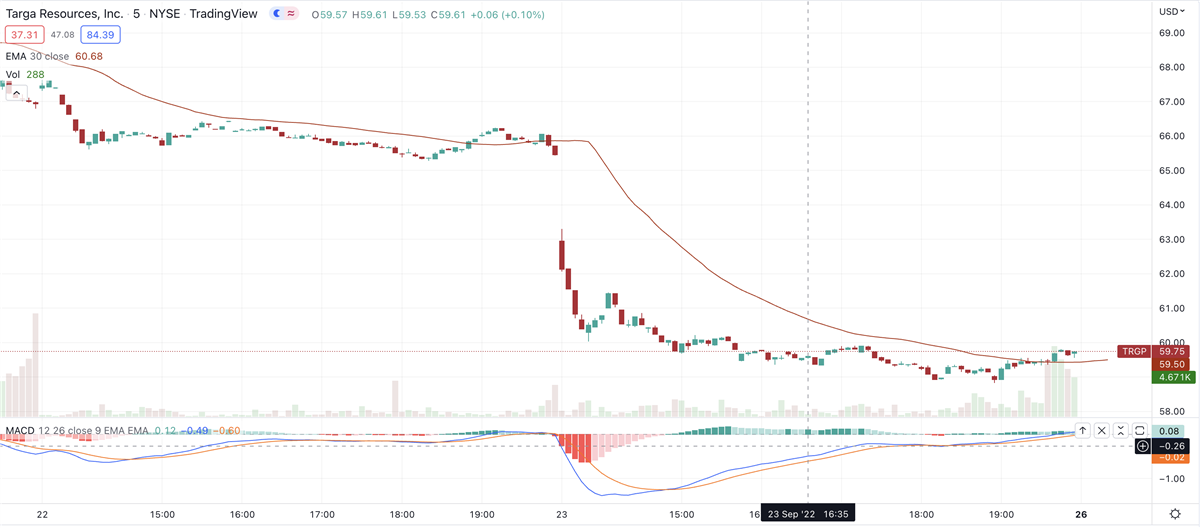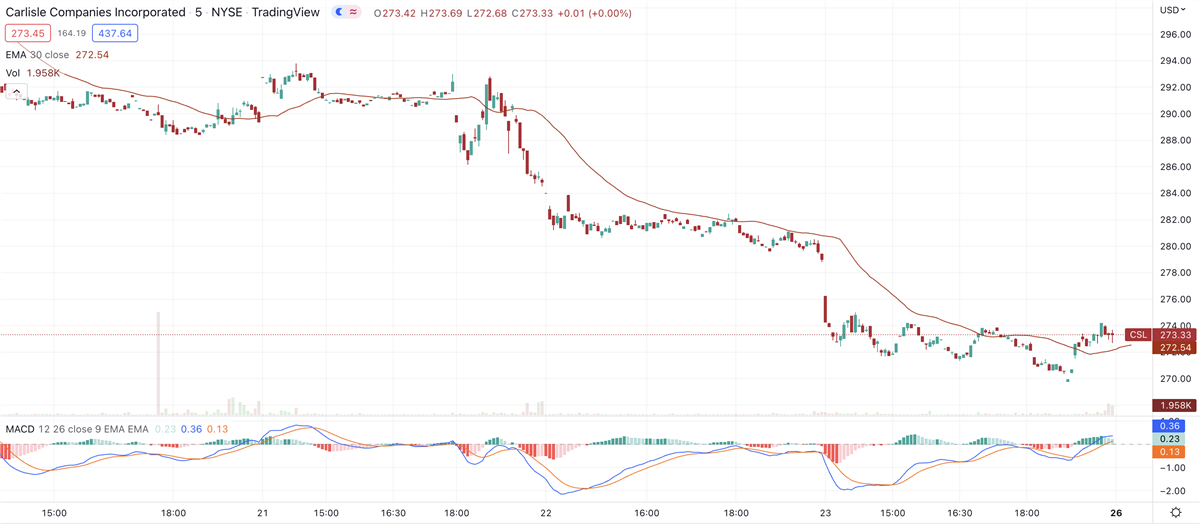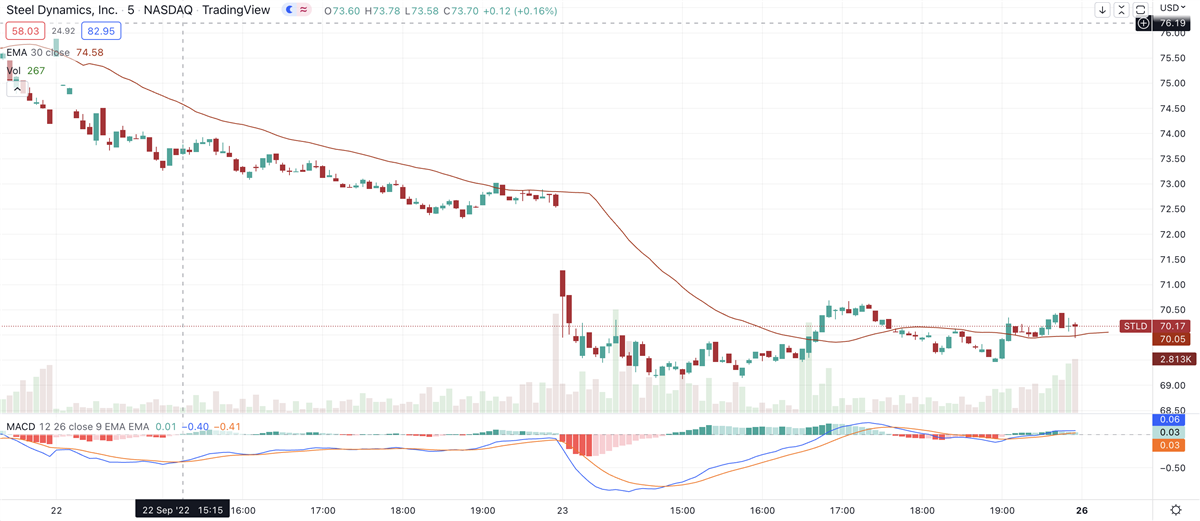Should These 3 Top-Performing Mid-Caps Be On Your Watchlist? The three biggest stocks within the S&P 400 are outpacing their index. While the market corrects, it's a good time to build a watchlist of solid performers.
By Kate Stalter
This story originally appeared on MarketBeat

- Analysts are optimistic about Targa Resources, but estimates could be slashed if a recession causes lower energy demand
- Carlisle Companies has a long history of profitability, which is a sign that's likely to continue
- Steel Dynamics is straddling two opposing trends, which could result in either lower revenue or increased revenue

In a familiar story, midcaps Targa Resources (NYSE: TRGP), Carlisle Companies (NYSE: CSL) and Steel Dynamics (NASDAQ: STLD), the largest components of the S&P 400 mid-cap index, all gapped down Friday along with the broader market.
Mid-caps are traditionally classified as those with market capitalizations between $2 billion and $10 billion, but all three exceed that level. In fact, Targa and Carlisle have market caps above $13.1 billion, which is the minimum to be included in the large-cap S&P 500. All three are larger than some S&500 components. (Indexes don't automatically kick stocks out when their market caps become too large or too small. Instead, changes may come when they re-constitute, at regular intervals throughout the year.)
Together, those three stocks comprise about 1.94% of the index. That's a far cry from the S&P 500, where the top three components, Apple (NASDAQ: AAPL), Microsoft (NASDAQ: MSFT) and Amazon (NASDAQ: AMZN), which together account for more than 16% of the index, therefore having an outsized effect on total performance.
Mid-caps have some characteristics of both large- and small-caps, in that they are often more stable than smaller stocks, but can still have better upside potential than larger names.
Targa is a Houston-based company engaged in the processing, sale, storage and transportation of natural gas and crude oil. The company operates in the Permian Basin and other shale-rich areas. Like many energy firms, it slashed capital spending in 2020 as investors demanded that reduction. The company suffered a loss of $7.26 per share that year, followed by a smaller loss in 2021.
Last year, the company slashed debt, but it still has a high debt-to-equity ratio. That's not uncommon in capital-intensive businesses like oil-and-gas gathering and production.
The stock itself has outperformed its index, returning 27.30% year-to-date, vs. the S&P 400's decline of 20.36%. That's in large part to the outperformance of the broader energy sector this year.
So what are the forward-looking projections for this stock?
Wall Street is eyeing earnings per share of $4.06 this year, following last year's loss. Next year, earnings are expected to come in at $5.53 per share, which would be a gain of 36%.
Of course, it remains to be seen whether demand for energy remains at the anticipated levels, but that's true right now of all sectors in a potentially shaky economy.
Mid-cap peer Carlisle Companies is a Scottsdale, Arizona, firm that designs and manufactures products including braking systems, specialty chemicals, lawn and garden equipment, roofing systems, and aerospace products.
This stock, too, is outpacing its index, with a 2022 return of 13.16. The stock fell 6.14% the week ended September 23, but at this juncture, it's too soon to try deciphering chart patterns and ascertaining whether a stock's correction looks productive. That part depends on the broader market.
That means it's more constructive to turn to the fundamentals. The company has a long history of profitability, as MarketBeat earnings data reveal. It also tends to beat revenue views. While that may seem like a rear-view mirror view, companies that beat estimates tend to continue along that trajectory.
For the full year, Wall Street expects Carlisle to earn $20.29 per share, a gain of 115%. 
Steel Dynamics is another company with a solid track record of profitability.
There are two opposing forces at work that could affect the Indiana-based manufacturer of flat-rolled, structural, rails, bars, and other steel products. First, the work-from-home trend could mean less construction of office buildings, which rely on the company's products.
However, the recently passed Inflation Reduction Act includes incentives for sourcing domestically-produced steel and other metal components.
As of now, analysts have a "hold" rating on the stock, according to MarketBeat analyst data. That seems appropriate for a company that's straddling divergent trends.
Analysts' consensus price target on the stock is $92.71, an upside of 32.09%.
This stock, too, has outpaced its index, with a year-to-date return of 14.18%.
At this juncture, consider very carefully whether you want to add any stocks to your portfolio, as there's no sign that capitulation has arrived. However, when building your watchlist, consider top-performing mid-caps with good prospects and a solid history of profitability. 









